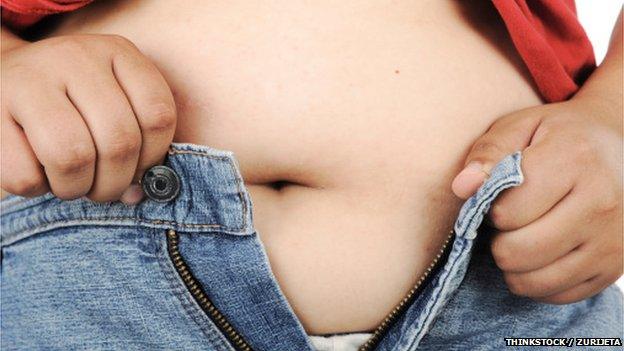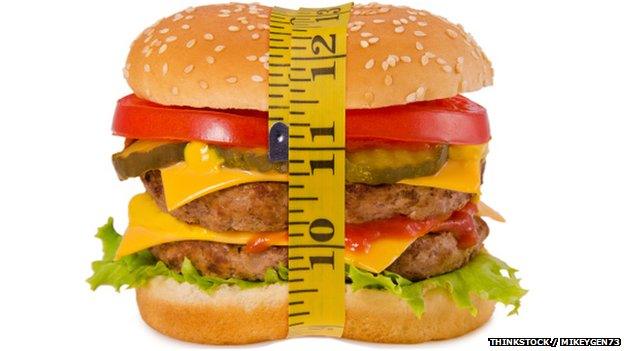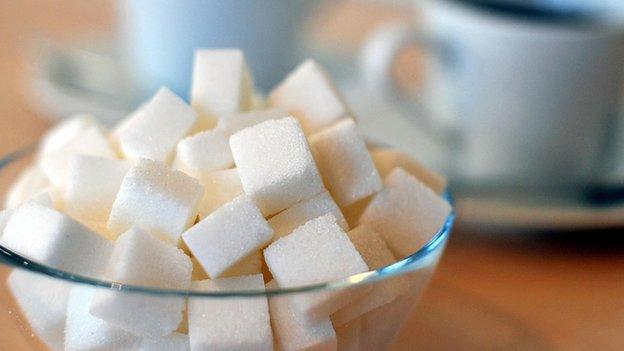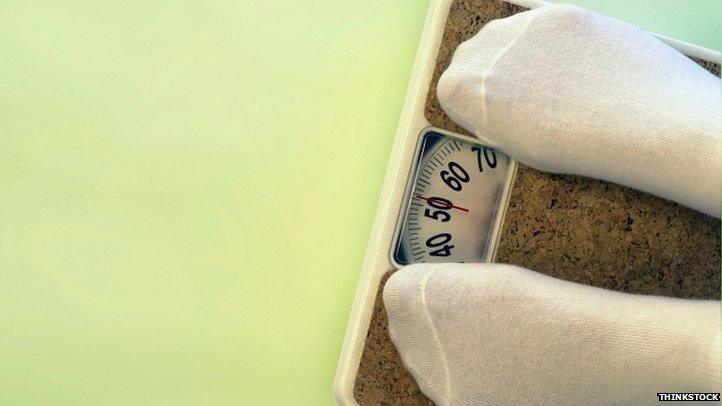Health leaders call for emergency taskforce on obesity
- Published
- comments

Health leaders are calling for an emergency taskforce to be set up to tackle childhood obesity in England.
In an open letter to the chief medical officer for England, Prof Dame Sally Davies, they say "an entire generation is being destroyed by a diet of junk food and sugary drinks".
They want an action group, made up of doctors, nurses, dieticians, dentists and schools, to be set up urgently.
Currently, around one in three children under 15 is overweight or obese.
The Royal College of General Practitioners and 11 other organisations signed the letter, which has been timed to coincide with the start of the new school year.
In it, health leaders call for better co-ordination of obesity treatment services so that all children can be encouraged to eat healthily from a young age.
They also call for a raft of other measures, including:
increased support for the National Child Measurement Programme, external
improved investment in IT programmes for weight management
more training in malnutrition and obesity for GPs and other health professionals
outreach projects to educate families about the dangers of obesity
The letter's signatories recommend setting up a national Child Obesity Action Group to tackle the problem.
'Lifetime of sickness'
Dr Rachel Pryke, clinical lead for nutrition at the RCGP, said a consistent national approach to treating obesity was needed.
"The nutritional patterns laid out in early years can define a child's health for life and the stark fact is that overweight children are being set up for a lifetime of sickness and health problems.
"As parents and health professionals, we need to take responsibility and ensure that every child has a healthy and varied diet and regular exercise."
She added: "Many schools are rising to the challenge and doing what they can in terms of education and outreach.
"Public Health England are already carrying out children measurement schemes and weight-prevention initiatives are widespread - but child obesity treatment provision is a postcode lottery with many areas having limited or no child obesity treatment services at all."

Dr Pryke said simply collating those figures was not enough and that a consistent response to these statistics was needed, right across the country.
Doctors leaders have also previously suggested banning adverts for fast food and introducing a tax on sugary drinks.
Generation in denial
Dr Nigel Mathers, a GP in Sheffield and a member of the RCGP, said there was a culture of denial among many of his patients.
"Many parents don't recognise their children are obese because many of them are obese themselves.
"Obesity is the new normal and we need a unified approach to manage it."
GPs say they are dealing with a generation of patients who may die before their parents.
Jennifer Taylor explains how a health scare made her lose weight
Also, because few people associate weight with cancer, children are growing up with a range of health problems that could develop into serious lifelong illnesses, such as Type 2 diabetes.
Dr Helen Stokes-Lampard from the Royal College of GPs said: "These kids are going to turn into larger and larger adults, which means they are at much higher risk of serious heart disease, cancers, strokes, as they get older.
"But even more worrying is some of these children, children as young as seven, are developing diabetes - and the sort of diabetes associated with increased weight in middle age."
Tam Fry, chair of the Child Growth Foundation and spokesperson for the National Obesity Forum, says the emphasis should be on stopping children getting fat in the first place.
He is sceptical that "another committee sitting around" will do much good.
"We need action now. We've got to start by doing proper monitoring of children's weight from birth and then every year of their lives - and this has to happen through the GP.
"Then GPs should be talking to them about their weight and acting on it."
A Department of Health spokesperson said: "Tackling obesity is one of our major priorities, but there is no magic bullet to solve the problem, and everyone has a role to play. We know that childhood obesity is at its lowest since 1998 but more should be done. The government is not considering a sugar tax."
The Department of Health added that the Chief medical officer would formally respond to the letter in due course.
Obesity in numbers
The latest figures, from the 2012 Health Survey for England, show that 14% of children aged two to 15 were obese and 28% were classed as overweight or obese.
Those aged 11 to 15 were more likely to be obese with one in five children placed in that category.
In children aged two to 10, 10% of both boys and girls were obese.
So with nearly one-third of children aged two to 15 classed as overweight or obese, the Royal College of Paediatrics and Child Health estimates that the problem is costing the NHS around £5.1bn a year.
It also says children living in the poorest areas of the country are almost twice as likely to be obese compared to those in the most affluent areas when they are at primary school.
- Published22 June 2014

- Published23 October 2013

- Published13 June 2013
